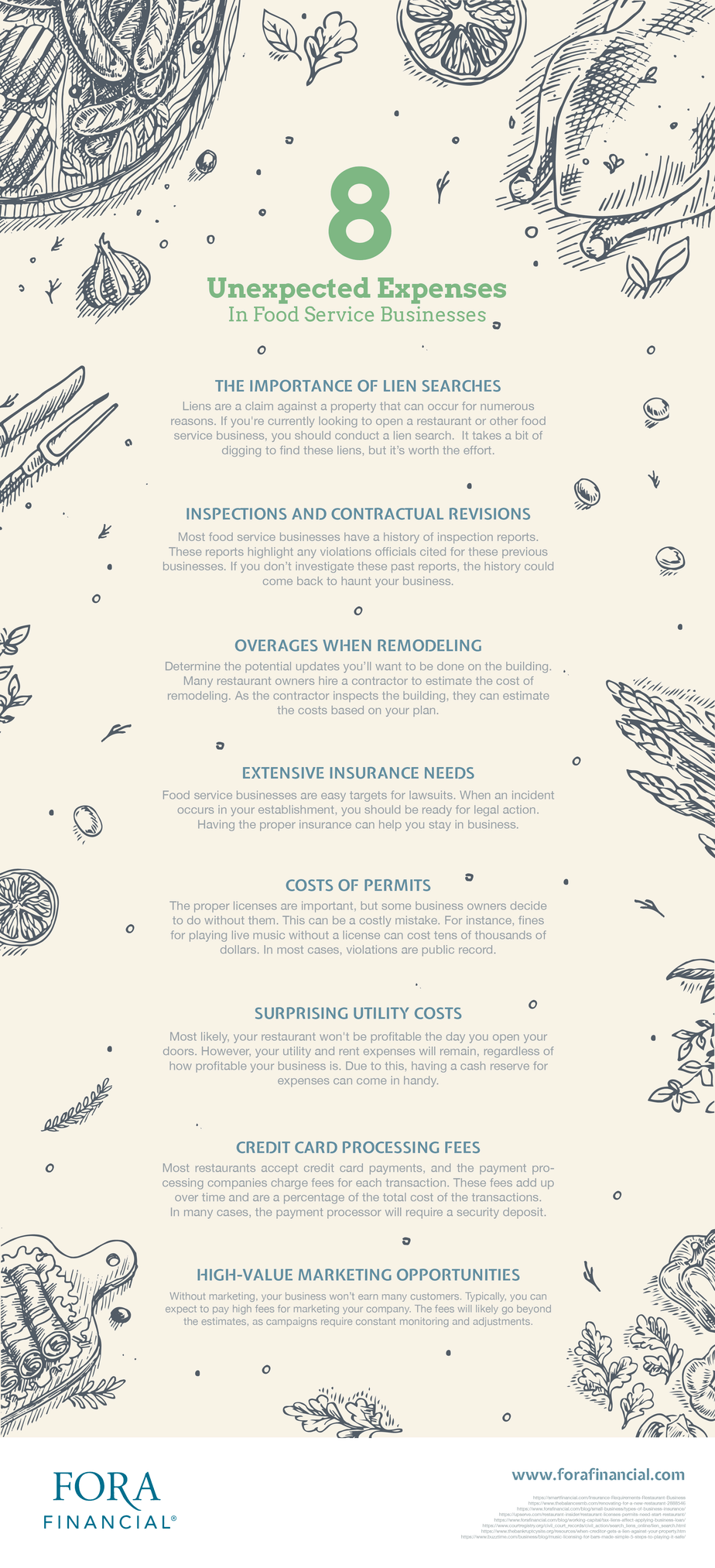February 01, 2020
8 Unexpected Expenses In Food Service Businesses
Food service businesses have a high failure rate. By knowing some of the hidden costs, business owners in this industry can tilt the odds more in their favor.



The Wild And Wonderful World of Food Service
The last time you ate at a food establishment, you likely noticed a busy staff. The food service business isn't for the timid, and this is especially true for business owners in this industry. The food service industry is highly competitive and subject to risks unknown to many other businesses. However, the rewards can be great. For those who overcome the challenges, they can make a nice living from their food service businesses. Running a food service business isn't a smooth path. Business owners in this industry can expect plenty of roadblocks along the way. Some of these roadblocks are self-inflicted and should be avoided. Others, however, are unexpected and can derail a food service establishment.Unexpected Expenses In Restaurants, Food Trucks, Bars and More
Typically, it isn't difficult to create a restaurant expenses breakdown for the costs that you know about. When you learn about possible unexpected expenses, you can create an estimate for these costs. As your business continues, you can adjust your budget based on their historical significance. In other words, some will occur more frequently than others, allowing for a more accurate estimate in the future. Food service businesses of all types will experience these unexpected costs. The types and frequencies of these costs may vary, but they are inherent in running a business in this industry.1. The Importance Of Lien Searches
Liens are a claim against a property that can occur for numerous reasons. Sometimes, it’s via agreement, like a mortgage or car loan. Other times, it can be the result of legal action, such as unpaid taxes or a mechanic’s lien. If you're currently looking to open a restaurant or other food service business, you should conduct a lien search. Relying on title searches are a good first step, but some liens can be missed. It takes a bit of digging to find these liens, but it’s worth the effort. When a lien exists for the business you purchase, it'll likely emerge during a critical time. For instance, when you apply for a loan, the lender may find liens on your business, which could affect your eligibility. It’s natural to believe that the previous owner is responsible for the lien. However, liens are usually placed on the property itself. Therefore, future owners would be responsible for satisfying the obligations of those liens.2. Inspections And Contractual Revisions
Most food service businesses have a history of inspection reports. These reports highlight any violations officials cited for these previous businesses. If you don’t investigate these past reports, the history could come back to haunt your business. The inspection reports are public record, which means you should have no trouble finding the information. Of course, it can be a source for the media to point out the violations of previous owners. When you learn about any violations, you can prepare for the possible negative stories spun by the press. Work with a lawyer that's familiar with the restaurant industry. These professionals will not only know where to find the historical information, but also can structure contracts with the right provisions.3. Overages When Remodeling
If you bought a house, you likely had the house inspected as a condition of the sale. Most real estate deals don’t happen without an inspection report. Business owners should perform a more extensive inspection of their restaurants before buying. Determine the potential updates you’ll want to be done on the building. Many restaurant owners hire a contractor to estimate the cost of remodeling. As the contractor inspects the building, they can estimate the costs based on your plan. Most construction projects exceed their estimates due to situations unaccounted for during the initial inspections. For this reason, inflate the estimates by a certain percentage often known as a fudge factor. The costs may even be higher than this percentage, but will be closer to the estimate. Try to work with a builder who understands the building codes in your area. When you suggest an update, he or she should know what permits you’ll need for them.
4. Extensive Insurance Needs
If a patron at your restaurant trips and falls, are you liable for damages? Can your restaurant be held liable for the actions of your employees? The answers to both of these questions are usually yes, and you're liable. Food service businesses are easy targets for lawsuits. When an incident occurs in your establishment, you should be ready for legal action. Having the proper insurance can help you stay in business. Work with a qualified insurance agent who's familiar with the intricacies of food service liabilities. Describe as many scenarios as you can think of to ensure you get the coverage you need. Ask about how you’ll be covered should each of the scenarios occur. Get everything in writing and read the fine print carefully. Insurance won’t remove your obligations, but it'll reduce the impact of any lawsuits significantly. In addition, you may want to review the coverage you have with your attorney.5. Costs Of Permits
Are you offering live music in your restaurant or bar? Will the performers play popular cover songs? If so, you’ll likely need a music license, which pays royalties to the artists of the songs played. A music license is just one of the costs that food service owners may need to obtain. If you plan on serving alcoholic drinks, you’ll need a liquor license. Handling food requires a license, as does serving the food. Your state and local municipality may have other permit requirements. The proper licenses are important, but some business owners decide to do without them. This can be a costly mistake. For instance, fines for playing live music without a license can cost tens of thousands of dollars. In most cases, violations are public record. Some license requirements are for items you wouldn’t think would be needed. For instance, if you have pool tables in your bar, you may need a license for people to use them.6. Surprising Utility Costs
Most likely, your restaurant won't be profitable the day you open your doors. However, your utility and rent expenses will remain, regardless of how profitable your business is. Due to this, having a cash reserve for expenses can come in handy. To determine how much you’ll need, you should determine your break-even point. To start, you should increase your estimates for your utility bills. The estimates are often based on older rates or on conservative usage estimates from previous owners. It’s also possible for utility companies to try and get you to pay for unpaid charges from previous owners. Ask before you sign any agreements. Most likely, you won't run your business exactly the same as the previous owners. This means you and your employees may use more utilities. If so, you should expect the costs to be higher.7. Credit Card Processing Fees
Most restaurants accept credit card payments, and the payment processing companies charge fees for each transaction. These fees add up over time and are a percentage of the total cost of the transactions. In many cases, the payment processor will require a security deposit. These can cost thousands of dollars and are used to cover the cost of potential fraud. It’s something to account for when estimating your budget. You can try to lower your credit card fees. Some rates may be negotiable, and you may have different pricing plans available. Choose the right one for your business. Some business owners will offer discounts for customers that pay with cash. Unfortunately, in the restaurant business, many customers prefer to pay via credit card. It’s more convenient, and they may get points towards rewards. It’s likely customers won't take advantage of discounts for paying by cash unless the discounts are substantial.
8. High-Value Marketing Opportunities
Without marketing, your business won’t earn many customers. Whether you use traditional newspaper advertising or create online marketing campaigns, spreading the word is important. Marketing is a skill that takes time and experience to master. Even professional marketing firms face changing conditions that cause successful campaigns to stall. However, there are plenty of amateurs that'll pass themselves off as experts, making it challenging to choose a qualified marketing company. When you find the right marketing company, they can do wonders for your business. Typically, you can expect to pay high fees for marketing your company. The fees will likely go beyond the estimates, as campaigns require constant monitoring and adjustments. These expenses will also depend on the type of marketing you're pursuing. For instance, a video campaign may be more expensive than social media efforts. When you hire a firm, understand what you're paying for and hold them accountable if they don’t deliver. Your marketing dollars should contribute to the growth of your customers. If it doesn’t, it’s time to find a new company.